Hanscom AFB FamCamp
Nice Campground near Boston
This is a nice campground near historic Lexington and Boston.
The state forests and recreation areas surrounding South Ashburnham, Massachusetts provide multiple developed campgrounds within a 15-mile radius. Lake Dennison Recreation Area Campground and Otter River State Forest offer tent and RV camping with varying levels of amenities, while several facilities like Pearl Hill State Park Campground and Willard Brook State Forest Campground feature cabins and yurts. Most campgrounds in this region maintain a natural, wooded setting with traditional camping experiences. Sites at these developed campgrounds typically include fire rings and picnic tables, with some offering electric hookups.
Camping availability in north central Massachusetts follows seasonal patterns, with most state-operated facilities open from mid-May through early October. Lake Dennison operates from late May to early September, while Otter River State Forest has a slightly longer season extending to mid-October. Reservations are recommended, particularly for weekend camping during summer months. Many campgrounds offer water access for swimming and boating, though amenities vary significantly between locations. Cell service throughout the region is often described as spotty or limited. One camper noted that Tully Lake Campground features a unique carry-in setup: "You park at the entrance, register with Ranger. Large wooden wheelbarrows are provided to bring your gear to your camp site. This means no noise or disturbances from cars entering your camp sites."
State forest campgrounds in this region generally receive positive reviews for their well-maintained facilities and natural settings. Campsites are typically spacious with adequate separation between neighbors, though privacy levels vary by location. The Pine Campground operates year-round, offering an extended season option compared to state-operated facilities. Water activities represent a significant draw, with several campgrounds situated near ponds or lakes for swimming and paddling. Hiking trails connect many of the campgrounds, providing recreational opportunities beyond the camping areas. According to visitor feedback, "This campground is clean and well kept. Lots of families here. Swimming in a pond or a short drive to a bigger lake. It's kind of a hidden gem in north central Massachusetts."
$17 - $35 / night
"The loop closer to the entrance has a lot of private sites. Although if you have one closer to the main road, it is quite noisy with road sounds. But many of the sites in the middle are more quiet."
"As a caveat, waterfront in this instance was more of a water view as the lake was on the other side of the campground road and a large open area with trees."
$17 - $55 / night
"Swimming in a pond or a short drive to a bigger lake (camping pass covers both). One of my favorites. It's kind of a hidden gem in north central Massachusetts."
"I loved it here, it was a great little campground for massachusetts"
$29 - $45 / night
"Campsites are well shaded but if you have an RV take the time to rent an RV site otherwise backing in will put you in and awkward position as the mixed use “standard” sites are oriented towards tent camping"
"The campsite is big and away from another site. You can easilly access to hiking trails. The staff there are friendly and helpful. It's definitely a plus."
$44 - $999 / night
"The pool is huge and clean and there is a ton of seating around. The shop has everything you could need. There are horseshoes, can jam, basketball, and bocce. There’s a playground and a rec room."
"Easily accessible by car to shopping, groceries, etc. but no hiking or good walking paths from the campground."
"Small river/ brook rind behind the campground. Some shots have nice sound of river right behind the sites. No pond or pool for swimming."
$17 - $35 / night
"We really lucked out with getting one of a few sites left on Memorial Day weekend - after walking the campground, I think we would have chosen the same one again! "
"It was like walking with fur on the bottom of our shoes. The dog also got needles stuck all over and we had to use our COVID alcohol gel to get the glue off. "
$40 / night
"Tully Lake Campground is located in Royalston, MA, which is a northern part of Central Massachusetts, near the New Hampshire border."
"Volleyball and horseshoes are near the entrance. You may purchase firewood. The bathrooms offer flush toilets and a single shower on each site, plus a dishwashing sink outside."
$42 - $65 / night
"Lake access with kayaks , some local hiking. Major grocery store nearby along with Walmart."
"the rules but everybody does and it's a good experience, everyone is very friendly the owners are wonderful people and super friendly very helpful it's clean they offer a lot of stuff to do right on a lake"
$14 - $55 / night
"This small state forest campground in north/central Massachusetts is just up the hill from Damon Pond. I suggest downloading maps before you head out because cell service is iffy in the area. "
"This campground is small - but its conveniently located near a larger city if you decide you want to venture back to civilization. The trails in the park are nice and well maintained."
$70 - $115 / night
"Miles and miles of country/forests surrounding pine acres, however pulling in you’ll soon realize how much goes on inside the campground."
"Although the tent sites are a distance from anything, the main areas of the campground are fantastic. With a full calendar of events (some free, some cost $) you will never be bored."
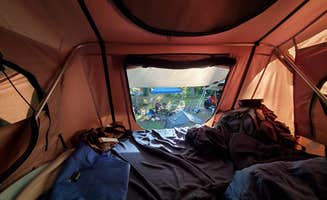
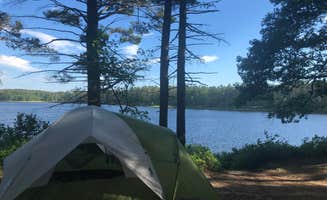
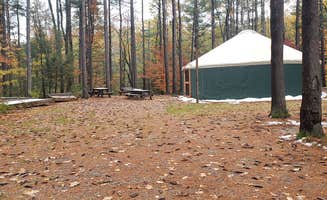
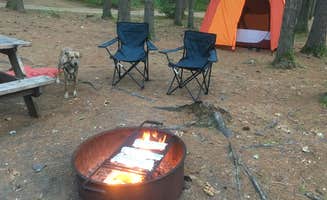
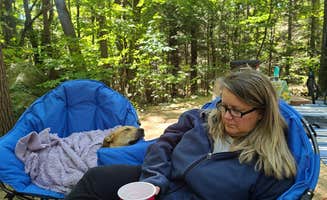
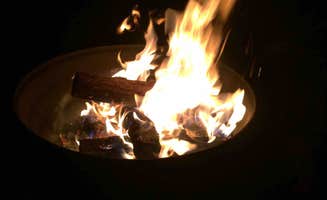
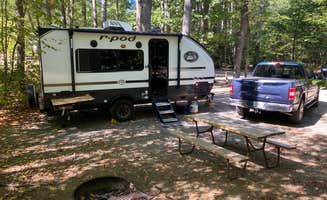
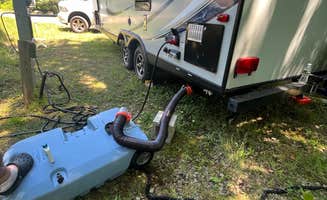
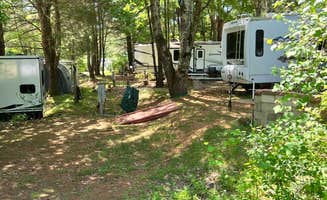
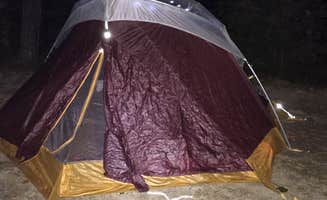
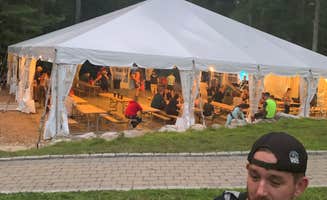
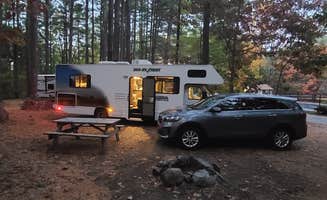
This is a nice campground near historic Lexington and Boston.
I stayed at the camp for about 2 months while working up in NH. And it was wonderful big pool and playground for the kids. Plenty of trails close to everything you need. Full hookup site was awesome
The staff was friendly. Don't forget the flashlight. There is very little lighting to find your way around the winding roads of the campground which adds to the charm.
I’m writing this mid-October from western MA. In between homes and looked forward to staying another night, but can not because of a 12 hour advance policy. There were plenty of tent sites available last night. Not a happy camper.
I am enjoying this camp still, even after 6 months. Management is wonderful and attentive. They take great care of the whole camp and us campers. Fun events are scheduled on the regular!
We stayed for 3 days off season so not busy. Sites located along the river are wooded, field sites are very open great for seeing the stars at night. Sites have fire rings with excellent airflow for good burning with low smoke. Hook ups are in great condition for power, water, sewer. Showers and bath house on site. Laundry and game room at office area. Office staff was very helpful and they’re open later into the day til 7 PM. Good firewood and large bundle delivered for $15 to your site. We passed over this site on our first trip to the area but are glad we came here and we’re planning to return. Follow the website directions to get here as there are covered bridges in the area with low Clearance and low weight limits.
We spent another great weekend at the Ashuelot River Campground. We recently purchased a new-to-us camper and wanted to get in a trip or two before putting it away for the winter. This was our 2nd visit to Ashuelot.
We were in site 59, a pull-through with water and 30/50 amp service. The site was level and easy to get into and park. We were in a fully wooded area on the left side of the campground, which we prefer. They have sites located in fully open areas, as well as some that are partially wooded and have river access. There is a nice mix.
Having good weather, we took a lazy tube ride from one side of the campground to the other. It has been quite dry in the area, so they are experiencing a drought. However, a little rain in the week got the river moving a bit. We were able to enjoy a nice, slow drift around the campground.
We thoroughly enjoyed our time again and will definitely be back.
Welcoming staff, nice campsites, and great amenities.
Lovely campground. Clean, good WiFi. Kind campers. Will be back
Camping in north central Massachusetts presents a mix of seasonal restrictions and accessibility considerations. Most campgrounds near South Ashburnham operate during the warmer months, typically closing between September and October when temperatures begin to drop. The region sits at approximately 1,000-1,300 feet elevation within the Monadnock Highlands, creating variable weather conditions that affect camping preparations.
Paddling activities: Tully Lake Recreation Area offers excellent water access for kayaking and canoeing around the lake's islands. "We can drop our paddle boards in any time and explore the lake. There is a tiny swimming beach on the campground side and we try to stay as close as possible to it," notes one visitor at Lake Dennison Recreation Area Campground.
Hiking trails: Several interconnected trail systems run between campgrounds. At Monadnock State Park, you can access multiple trail options. "I loved that there were trails to hike from right in the park; you could do a short one, or a slightly longer loop (2.5 hours depending on your pace) with some inclines and boulders to scramble up and over," reports a hiker.
Swimming options: Most campgrounds offer swimming access through beaches or designated swimming areas. "The lake is perfect for swimming, kayaking, and fishing. There are ample trails for hiking and kids can ride their bikes," explains a camper at Lake Dennison Recreation Area Campground.
Privacy levels: Site selection greatly impacts privacy. At Willard Brook State Forest Campground, "Site 3 is a great site. Large and separated enough from others." Many campgrounds offer varying degrees of seclusion based on loop location.
Clean facilities: Most state park campgrounds maintain their bathroom facilities well. A visitor to Pearl Hill State Park Campground notes, "Bathrooms are kept pretty clean. Campsites are large and are spaced well apart."
Water sounds: Several campgrounds feature sites near running water. At The Pine Campground, "Most of the daily/weekly sites back up to a stream, which is nice. You can hear the water running, especially at night," according to a regular visitor who appreciates the natural soundscape.
Cell service variability: Reception depends on provider and location. At Tully Lake Recreation Area, "Cell coverage is pretty close to absent or poor in most of the area, so download any maps you might want (driving, trail, geocaching) before you arrive." Verizon tends to work better than other carriers in most locations.
Site access considerations: Some campgrounds have unique setup requirements. Tully Lake features "a 'Carry In' campground. You park at the entrance, register with Ranger. Large wooden wheelbarrows are provided to bring your gear to your camp site." This means no vehicles are allowed at campsites.
Reservation timing: Popular campgrounds fill quickly during peak season. For Tully Lake, "The sites fill up weeks out (and can completely fill the day registration opens, which is date-dependent each year...Booking for Memorial Day meant I booked in April), so you have to be on your game."
Playground access: Several campgrounds offer play areas for children. At Otter River State Forest, visitors note there's "a large playground for kids <12 and a wide open day use area for picnicking. It would be a great place to run around and play games."
Bug preparation: Mosquitoes can be significant, especially in wooded tent sites. A camper at Minute Man Campground advises to "Bring bug spray especially if it's humid or raining."
Swimming beaches: Family-friendly water access varies by location. Lake Dennison Recreation Area Campground has "a gorgeous campground with clean facilities and responsive rangers. The sites on the North side are spacious & quiet... The lake is perfect for swimming, kayaking, and fishing."
Size restrictions: Many campgrounds limit RV length. Pearl Hill State Park Campground notes that "You can get in here with a smaller RV, but the campground isn't built for larger units with the turns and curves. They've only designated 3 sites for 35' rigs; everything else is 15-20'."
Hookup availability: Electric and water availability varies. At Otter River State Forest, "65, 67, 68 are walk-in sites, with the tent area lower, closer to the water. At the top of the hill, there are several yurts available. Dump station and additional swimming/water activities are a little farther down the road at Lake Dennison."
Site leveling: Terrain can affect setup ease. "Sites are largely level, around a small, bisected loop with towering pines," notes a visitor to Willard Brook State Forest Campground, which is better for smaller trailers and teardrops than large RVs.
Frequently Asked Questions
What camping is available near South Ashburnham, MA?
According to TheDyrt.com, South Ashburnham, MA offers a wide range of camping options, with 133 campgrounds and RV parks near South Ashburnham, MA and 2 free dispersed camping spots.
Which is the most popular campground near South Ashburnham, MA?
According to TheDyrt.com, the most popular campground near South Ashburnham, MA is Lake Dennison Recreation Area Campground with a 4.6-star rating from 14 reviews.
Where can I find free dispersed camping near South Ashburnham, MA?
According to TheDyrt.com, there are 2 free dispersed camping spots near South Ashburnham, MA.
What parks are near South Ashburnham, MA?
According to TheDyrt.com, there are 15 parks near South Ashburnham, MA that allow camping, notably Tully Lake and Edward MacDowell Lake.
Keep Exploring